De Amerikaanse schrijver William Styron werd op 11 juni 1925 in Newport News in de staat Virginia geboren. Zie ook alle tags voor William Styron op dit blog.
Uit: Sophies keuze (Vertaald door Wim Dielemans)
“Mijn hart raakte altijd even van slag en ik voelde me misselijk worden, wanneer Wanda het over wapens had, of over geheime ontmoetingen, of wat verder maar met gevaar te maken had, of met de mogelijkheid door de Duitsers opgepakt te worden. Gepakt worden als je joden hielp, betekende de dood, weet je. Ik werd dan helemaal klam en slap – o, ik was zo’n lafaard! Ik hoop dat Wanda nooit iets van die symptomen gemerkt heeft, en als ik er last van had, vroeg ik me soms af of lafheid misschien niet één van die dingen was die ik van mijn vader had geërfd.”
(…)
“Sophie herinnerde zich nog dat de adem van de Gestapo-agent naar kaas had geroken, en ook de woorden die hij had gesproken, terwijl het mes de bil van wat tot voor kort een tevreden varken was geweest binnendrong. ‘Waarom zeg je niet “Au”, Liebchen?’ In haar angst was ze tot niet meer in staat geweest dan het stamelen van een wanhopig gemeenplaats, hetgeen werd beloond met een compliment wegens de voortreffelijkheid van haar Duits.”
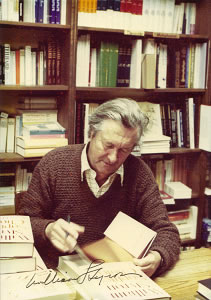
William Styron (11 juni 1925 – 1 november 2006)
De Britse dichteres en schrijfster Renée Vivien (eig. Pauline Mary Tarn) werd geboren op 11 juni 1877 in Londen. Zie ook alle tags voor Renée Vivien op dit blog.
Sad Bacchante
Day no longer pierces, with proud arrow and lance,
The woods, amazing in their beauty nocturnal.
This is the turbid hour when Bacchantes dance,
Amidst oppressive rhythms, languid and vernal.
Their hair tangles, dripping with the blood of the vines;
Their lively feet, like the wings of the wind, are light,
And their rosy flesh, the suppleness of their lines,
Imbues the forest with ever-shifting delight.
The youngest sings a song which calls to mind a wail:
Her amorous breast, with deep sobbing, is heavy.
She is not at all like the others – she is pale.
Her face has the stormy bitterness of the sea.
The wine, where the sun of the season will persist,
No longer brings generous oblivion now;
She is half-drunk, but her sorrow will not desist
And a wreath of dark leaves surrounds her pale brow.
To all in her, false gaiety brings weariness,
And the presentiment of cold and hard daybreak
Comes to spoil the glowing sweetness of the caress.
Among the festive roses she dreams, though awake.
What she remembers are the kisses they forget…
She cannot learn to desire without feeling grief,
She who gazes still, with melancholy beset,
At flowers dying after night orgies, so brief.
Vertaald door Valkyria
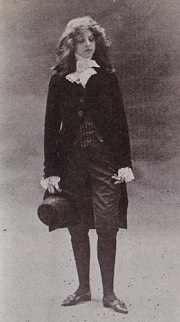
Renée Vivien (11 juni 1877 – 10 november 1909)
De Franse schrijver Jean-Pierre Chabrol werd geboren op 11 juni 1925 in Chamborigaud. Zie ook alle tags voor Jean-Pierre Chabrol op dit blog.
Uit: Les Fous de Dieu
“Un soir, au cagnard d’un ranc, mon aïeul m’a dit ma race.
Je viens des nuits où les hommes de la terre n’avaient rien, pas même de nom, n’étaient rien et naissaient et mouraient sans laisser plus de traces qu’un lièvre sur un pré. Au temps de la Narbonaise, de l’Aquitaine ou du Comté de Toulouse, sous les Francs ou sous les Goths, l’un des nôtres put acquérir un chevreau femelle en propriété, d’où son fils eut un couple, son petit-fils un troupeau, son arrière-petit-fils le nom de chevrier qui est le nom de la race depuis lors. Volant au sommeil le temps de travailler pour eux, tandis que les bonnes heures ensoleillées étaient pour le fief de Coudouloux, les chèvres s’accommodant de la traite aux deux bouts de la nuit, les serfs purent amasser de quoi acheter au seigneur une partie d’eux-mêmes, ainsi les fils de la lignée chevrière naquirent vilains. Le lait caillé dans les nuits de plusieurs générations, les piécettes des fromages passées sournoisement à travers guerres et logements mercenaires, descentes des Saxons et montées des Sarrasins, permirent aux Chabrous d’acquérir un pan de caillasse au pire de la montagne. le granit fut brisé, les cailloux cassés en gravier, le gravier écrasé, émié, de père en fils, en petit-fils. Tout en nourrissant leur seigneur, subsistant eux-mêmes de leurs chabros, traites après le crépuscule et avant l’aube , il leur suffit pourtant de quelques générations pour faire la terre de leurs mains. Puis il y eut le siècle des Chabrous, qui haussèrent la terre en traversiers, le siècle qui y sema les châtaigniers, le siècle de la vigne, le bon siècle du mûrier, du magnan, de la soie, de la poule au pot, où ma race gardait les chèvres du nom et de la lignée en lisant Dieu à livre ouvert. Enfin le siècle où mon grand-père du défendre son bien, et son Gravas, et ses chèvres, où mon père souffrit pour son Dieu, pour les siens, pour son mas.
Voilà, et voici que le gravier grignote la bonne terre du Gravas, voici que des chabros de la lignée, il n’en survit pas une seule, et de leurs chevriers, le dernier, nu dans la tempête, et blessé déjà… “
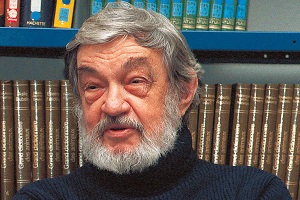
Jean-Pierre Chabrol (11 juni 1925 – 1 december 2001)
De Nederlandse schrijfster Sophie van der Stap werd geboren in Amsterdam op 11 juni 1983. Zie ook alle tags voor Sophie van der Stap op dit blog.
Uit: Meisje met negen pruiken
‘Vandaag heb ik mijn blonde krullen weer eens uit de kast getrokken en ben ik als Daisy over straat gegaan. Een complete transformatie. Mijn Italiaanse vrouwelijke hakjes veranderen plots in hoerenstappers, mijn modieuze strakke spijkerbroek in een sexy stofje en mijn onschuldig decolleté in een heuse trekpleister.
Daarom houd ik zo van Daisy. Daisy maakt haar beste entree na een korte rustpauze en wanneer ze haar krullen guitig laat rond dansen. Iedereen is namelijk benieuwd wie er achter die blonde elfenkrullen schuilt. Ik laat Sophie dan graag in de kast staan om mijzelf ondeugend als Daisy voor te stellen.’
(…)
‘Daar verscheen hij dan, de zoveelste witte jas die mij wel even zou gaan bestuderen om me later te condoleren met mijn akelige prognose. Dat ook deze witte jas aangenaam bleek verbaasde mij niks na twee bezoeken aan de eerste hulp. Daar had ik al lang bedacht dat dit de plek is om mijn seksuele eenzaamheid te vergeten. Een beetje praten en een beetje voelen. Opnieuw opgewekt door mijn nieuwe arts sukkelde ik het zoveelste witte kamertje in. Thank God it’s a men’s world.’
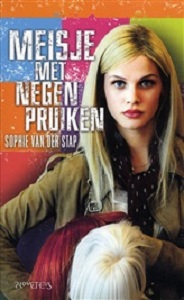
Sophie van der Stap (Amsterdam, 11 juni 1983)
Cover
De Engelse dichter en schrijver Ben Jonson werd geboren rond 11 juni 1572 in Westminster, Londen. Zie ook alle tags voor Ben Jonson op dit blog.
Begging Another
For love’s sake, kiss me once again;
I long, and should not beg in vain,
Here’s none to spy or see;
Why do you doubt or stay?
I’ll taste as lightly as the bee
That doth but touch his flower and flies away.
Once more, and faith I will be gone;
Can he that loves ask less than one?
Nay, you may err in this
And all your bounty wrong;
This could be called but half a kiss,
What we’re but once to do, we should do long.
I will but mend the last, and tell
Where, how it should have relished well;
Join lip to lip, and try
Each suck other’s breath.
And whilst our tongues perplexed lie,
Let who will, think us dead or wish our death.

Ben Jonson (ca. 11 juni 1572 – 6 augustus 1637)
Sebastian Armesto als Ben Jonson in de film “Anonymous”, 2011
De Japanse schrijver Yasunari Kawabata werd geboren op 11 juni 1899 in Osaka. Zie ook alle tags voor Yasunari Kawabata op dit blog.
Uit: Snow Country
“But even more than her diary, Shimamura was surprised at her statement that she had carefully cataloged every novel and short story she had read since she was fifteen or sixteen. The record already filled ten notebooks.
“You write down your criticisms, do you?”
“I could never do anything like that. I just write down the author and the characters and how they are related to each other. That is about all.”
“But what good does it do?”
“None at all.”
“A waste of effort.”
“A complete waste of effort,” she answered brightly, as though the admission meant little to her. She gazed solemnly at Shimamura, however.
A complete waste of effort. For some reason Shimamura wanted to stress the point. But, drawn to her at that moment, he felt a quiet like the voice of the rain flow over him. He knew well enough that for her it was in fact no waste of effort, but somehow the final determination that it was had the effect of distilling and purifying the woman’s existence.”
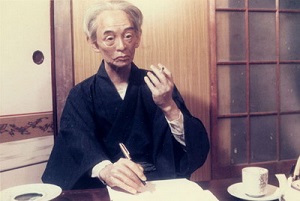
Yasunari Kawabata (11 juni 1899 — 16 april 1972)
Zie voor nog meer schrijvers van de 11e juni ook mijn blog van 11 juni 2012 en ook mijn blog van 11 juni 2011 deel 2.
